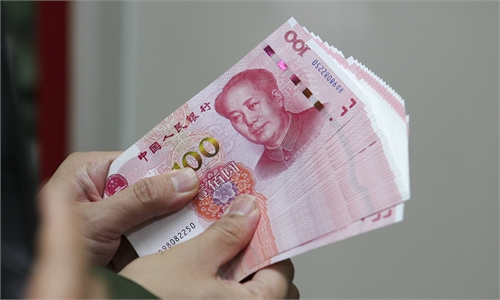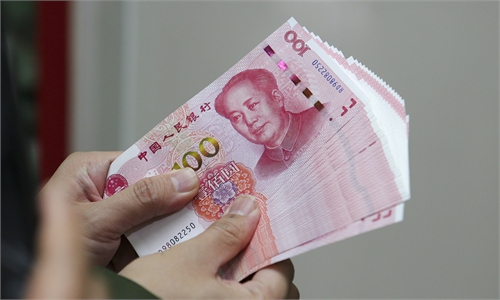
Illustration: Chen Xia/Global Times
Amid a global push toward de-dollarization, the Chinese yuan's internationalization has made strides, but, obviously, this is not what US politicians want to see. Some Western media outlets discredit China by attacking currency swap lines, trying to divert people's attention from the Federal Reserve's irresponsible monetary policy, although these criticisms against China are groundless.The latest example is a Wall Street Journal (WSJ) article on Sunday claiming that some troubled countries, which is hungry for foreign currency to shore up their dwindling reserves, have in recent years turned to an unusual source of funds: swap lines that allow overseas central banks to exchange their domestic currencies for Chinese yuan.
The WSJ criticized that the swaps help "paper over problems" that led to financial perils in those "troubled countries," citing economists.
Criticisms against swap lines made by Western media outlets comes at a time when more people across the world have realized the urgency of de-dollarization. Since March, the Fed has already increased interest rates several times, and its monetary tightening has made it more expensive for developing countries to meet their dollar-denominated debt obligations.
Although multiple factors such as the COVID-19 pandemic relating to the debt problems facing the global economy, one thing cannot be ignored: a strengthening dollar means higher borrowing costs for emerging countries. Many believe the Fed's irresponsible monetary policy will inevitably affect the hegemony of the US dollar over the long run. As the Fed continues to raise interest rates, the already-emerging global de-dollarization push will likely further accelerate with countries increasingly adopting alternatives to the US dollar.
In the first quarter of this year, the Chinese currency accounted for 2.88 percent of global foreign currency reserves, up 1.8 percentage points from 2016 when it entered the IMF's Special Drawing Rights basket, according to media reports. This reflects a steady step in the yuan's internalization, which is probably the last thing some US politicians want to see.
It comes as no surprise that some Western media outlets try to discredit the Chinese economy by attacking currency swap lines. However, these accusations are false, baseless and incredible. There are deep-seated problems that led to financial perils in some developing countries, and a strengthening dollar is one among them. Some Western media outlets want to throw dirty water on China, but that will be futile in the end. At the very least, it doesn't make sense for China to "paper over problems" caused by the Fed's irresponsible monetary policy.
So far, China's central bank has signed swap deals with dozens of countries and regions. An extensive network of such agreements will help inject yuan liquidity into overseas markets and improve yuan-denominated trade activities in the short and medium term. Bilateral currency swap agreements are designed to facilitate trade and make bilateral investment more convenient, marking new progress in financial cooperation.
The internationalization of the yuan has been accelerating in recent years, propelled by rising market demand. Against the backdrop of a growing trend of de-dollarization, there is still huge room for accelerating its internationalization as foreign demand for the yuan continues to increase.
More importantly, the internationalization of the currency relies on the country's economic fundamentals. As China optimizes its epidemic prevention and control measures, the international community's confidence in the Chinese economy will further improve and the willingness to use the yuan will also increase.
It is futile to discredit the Chinese economy. China should follow its own speed and rhythm in the establishment of bilateral currency swap arrangements to push forward the internationalization of the yuan steadily.
The author is a reporter with the Global Times. bizopinion@globaltimes.com.cn



